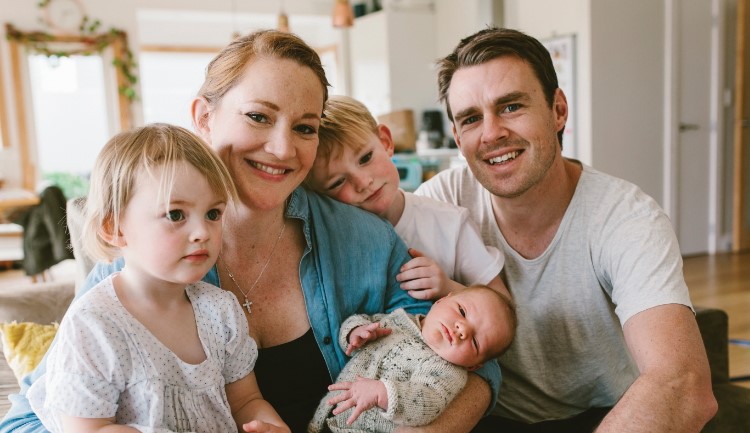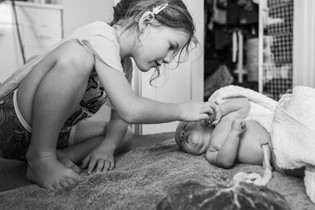Unique gifts: parenting gifted or dyslexic children

Two mothers share their stories of having young kids with extreme abilities.
It can be a long, winding and fairly expensive road trying to figure out whether your child has special learning needs. However, by 2025, all New Zealand schools will start testing and screening their students for dyslexia, giftedness and other special learning needs. The results will be registered in a national database, along with strengthened early intervention for preschoolers. And, an additional $29.6m will be injected into responding to growth in demand and improving support systems for children. By next year, there should be 600 learning support coordinators in schools to provide individualised support for students. We asked two parents to share their stories of having gifted and dyslexic children.
TWICE EXCEPTIONAL: DYSLEXIA AND GIFTEDNESS:
Anna McKessar is a mum-of-three, with a twice-exceptional school-aged child.

The term ‘twice exceptional’ refers to gifted children who have a special learning need. Anna’s son is gifted and has dyslexia.
“My son has always just been himself. He’s a bit quirky, kind, sensitive and a deep thinker when it comes to his favourite things. In some ways he’s exceptionally clever, but in other areas he struggles to learn things that come easily to most other kids, like writing down his ideas. His official academic assessment is dyslexic and gifted. I’ve heard people describe it as driving a race car that’s stuck in second gear.
In hindsight, there were a few things we noticed when he was wee that may have indicated that he was twice exceptional. He was sensitive to noise and stimulation, he never crawled, he didn’t catch on to rhymes the way my other children did, and although he loved us reading to him, he had no interest in writing his name. During his first 18 months at school, he’d work really hard to learn new words, but completely forget them a week later. Everything seemed really hard for him; writing was like getting blood from a stone and reading involved a lot of guesswork and patience. In many ways, he was like loads of other boys his age, only these difficulties didn’t decrease with time. As the school year ticked by, I watched things fall into place for his classmates, but they just didn’t for my son.
DISCOVERING DYSLEXIA
After the summer holidays, he returned to school with a little more maturity, and more of the elusive ‘focus’ his teacher had kept talking about. But his literacy had slipped all the way back to square one. Because our son has a fantastic memory and a quick mind, he flew under the radar a little – to some extent his giftedness masked his disability. However, the gap between him and other kids grew, and his sight-word repertoire didn’t keep up with the curriculum. His writing was slow and confused, and he got very frustrated. His confidence took a hit and he began to lose the desire to even give things a go because it was too hard and demoralising. It was heart-breaking. My mind kept rushing ahead: how would he survive high school? Would he give up and act out his frustration? If so, would that screw up his chances for a happy and independent future? What if he lost hope? What if he couldn’t believe in himself or see the wonderful things I could see in him?
SEEKING SUPPORT
Needing advice, I asked a friend who is a teacher and who has gifted and dyslexic kids herself. She suggested we get our son academically assessed sooner rather than later, and this was the best thing we could have done. We used an independent Educational Psychologist who was also a registered SPELD (Specific Learning Disabilities) assessor. The assessment gave weight and context to our son’s learning needs: now he’s officially a kid who needs specific help and support, as well as extension in his learning because it’s important to keep him excited about learning, so it’s not all just hard work.
The school put him in to reading and writing support groups and he sees an onsite SPELD tutor for an hour a week. Although the tutor is an independent contractor we pay for, she sees him at school during class time, and has access to, and contact with, his other teachers. My son and I work together on the homework the tutor sets, and her careful teaching of phonics has seen him really improve in this area.
Although he loves school, literacy issues are always going to be hard work for my son. We know we’ll have to keep looking for creative solutions to keep him on the right track, and work with his schools to organise support and find the best ways for him to communicate his knowledge. I find his avoidance of, and resistance to, writing extremely challenging at times and I have to work hard to find empathy and patience amongst the frustrations we both feel. It’s a big and ongoing learning curve.
My main advice to parents of twice exceptional children is to advocate for them! Let people know about the amazing things your little person can do, and what makes them tick. Push for the things they need, because if you don’t, who will? Our school systems are so stretched that many teachers simply don’t have the capacity or the resources to notice the little things that you see, or to give your child the support they need. If you can do some of the sleuthing yourself, and then partner with your school in an ongoing way, your wonderful child will have a much better chance at success.”
A GIFTED CHILD: Holly Jean Brooker is a mum-of-two, with a gifted school-aged child.

“My husband and I noticed that our child operated differently pretty early on, but we didn’t want to put him in a box, or label him as different. If I’m honest, we worried what doing that would mean for us. We figured out how best to work with him, and I felt I intuitively understood our son and how to support him.
Montessori kindergarten really suited him but he needed one-on-one support there, so I continued working part time as a free-lancer to keep the kindy sessions down. When he was three-and-a-half, his knowledge of how things worked had grown to the point where he often knew more about certain things than I did. He’d blow me away with his in-depth conversations, and he. Did. Not. Stop. Asking. Questions. Ever! By now we knew we needed to support his learning so he was extended, not bored. He was accepted into a weekly preschool programme in the New Zealand Centre for Gifted Education (NZCGE) and here a light bulb turned on for us all. My son was absolutely hooked; he’d found his place and he came alive!
BREAKTHROUGH!
By following strict routines we were able to keep life operating smoothly. We’d developed a special bond with our son, but when things weren’t as expected or new it would be overwhelming. I vividly remember the first day we arrived at the NZCGE preschool – my son was pretty overwhelmed. The other parents could tell it had been a hard morning for us, and as we talked, I felt properly understood for the first time. Some of our kids were really similar in their nonconformist behaviour, their need for constant mental stimulation, their intense preoccupation with understanding things, their perfectionism, anxiety and heightened sensitivities, their high levels of comprehension for their age, and their intense need for routine and structure. What a breakthrough! That morning, all I could do was cry – I think I even ugly- cried! It was the start of an exciting and reassuring journey.
Having a gifted child isn’t something I’ve broadcast to the world. It’s a hard concept for people to understand and there are many misconceptions. I worry people will think I’m showing off, because using the word ‘gifted’ sounds as though I think I have a ‘genius’ child – and it’s not like that at all. Yes, he’s bright and knowledgeable beyond his years, but it also means our child is wired differently, and that’s the same as having a special need that requires extra attention and support.
STARTING SCHOOL
When it was time for our son to start school, my husband and I were nervous. As an ex-high school teacher, I know that nonconformists don’t always thrive in the education system. We visited private, public and alternative schools, and asked many questions. We wanted to find a place that genuinely understood giftedness and could support our son. The incredible school we chose put him on an Individual Education Plan and allowed him to keep attending the NZCGE Mindplus school one day a week. Plus, they ‘got’ him. It’s worth the extra travel time to see him happy, thriving and fully taking part.
Now, he’s a well-adjusted, fun-loving kid, with cool and quirky traits we adore, but we still need routines, and things aren’t always rosy. He’s incredibly wise for his age and self-manages when he knows things will be too much for him. All we want is for him to continue to LOVE learning and to be happy with who he is. One of our family sayings is ‘Everyone is different and that’s okay’, and we truly believe that.”

|
TIPS FOR PARENTING GIFTED OF DYSLEXIC CHILDREN ✔ Advocate for your children to ensure they’re supported outside the home. Being their voice and doing what’s best for them is more important than what people think of you. Do it gently though! ✔ Although a gifted child can be incredibly bright and can understand certain complex issues, some things will need more effort, and take longer. Following instructions can also be hard. ✔ Your child will have some incredibly unique strengths that are more important than their grades. ✔ Keeping your child intellectually stimulated is important to their happiness, and seeing them in their element – discovering things – is gold! ✔ Gifted kids may have intense reactions and high sensitivity to a range of things, such as large crowds, noise, fabric on clothing, the texture of food, movements (eg escalators or lifts) and sleeping in new places (in fact, this is impossible when they’re very young). ✔ Keeping a safe, consistent routine is essential. ✔ Shake it off! There’s no rulebook to follow, so do what works for you and your child. ✔ Getting professional advice for how to support and extend your child is a solid investment. Having sessions with a child psychologist or parenting coach is worth every penny. Ask your GP for advice about where to start. ✔ Gifted kids may have intense emotions and a very strong sense of morality and justice. They can also get really tired and drained socially. Scheduling regular slots of alone time to replenish their energy is helpful. |
PEARLS OF WISDOM
Psychologist Dr Melanie Woodfield shares her thoughts: “We all have strengths, and we all have weaknesses relative to these strengths. It’s important for any child to feel a sense of mastery in something, but particularly for those who might have a poor fit with the standard school system. Their strength doesn’t need to be something academic. Maybe your child struggles with writing, but knows that they’re the go-to guy for fixing things at home, and are really valued for their skills there. Or they win every Bey Blade battle hands down. These strengths might start to show themselves in the preschool years, or they might take a little longer.”
PHOTOGRAPHY: Jodi Currie & Peta Mazey. Main image posed by models

AS FEATURED IN ISSUE 48 OF OHbaby! MAGAZINE. CHECK OUT OTHER ARTICLES IN THIS ISSUE BELOW

















